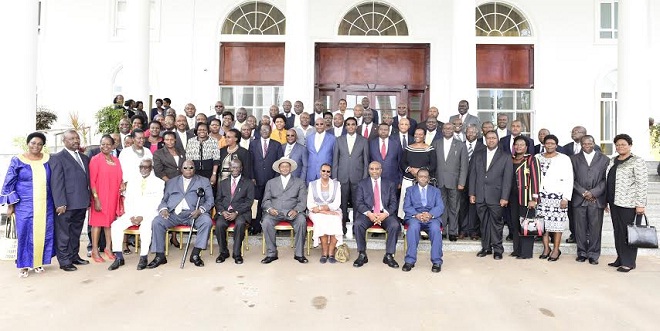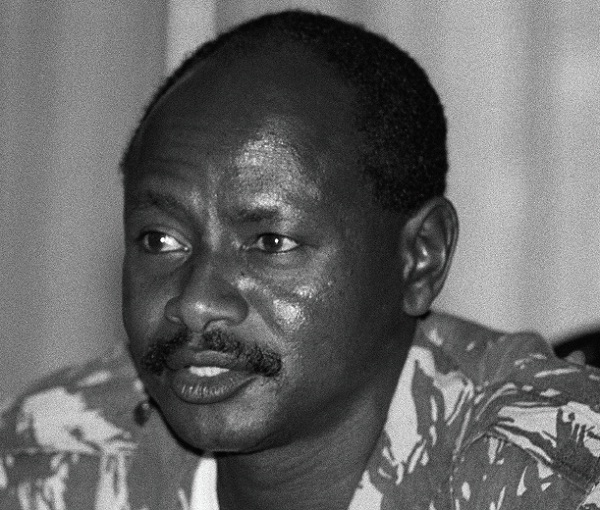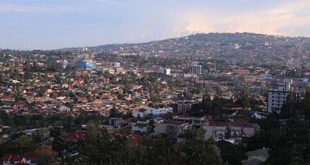On May 4, President Yoweri Museveni held an emotional last meeting with his outgoing cabinet at State House Entebbe. Its high point was a group portrait taken on the main front porch. The photo exposes, in an amazing way, the changes coming in Museveni’s next government.

The photograph (above) has been analysed over and over again and three common motifs have emerged. The most easily noticed but least important is that Prime Minister Ruhakana Rugunda should have sat on Museveni’s right after Vice President Edward Sekandi to reflect their constitutional hierarchy.
The other is that the only historicals in it – Jim Muhwezi and Kahinda Otafiire stand desperately directly behind Museveni, as if fearing that they could be swept out of it at any moment.
The campaign period is over and none of the ministers wore yellow, the NRM party colour, except Sam Kutesa who also stood behind Museveni like his ADC and Muhwezi who wore yellow ties.
Finally, that the average age of the front row where Museveni is seated with six others – his wife, Janet Museveni, Ssekandi, Rugunda and his three deputies – Kirunda Kivejinja, Moses Ali, and Henry Kajura – is 75 years. Museveni who is 71-years old is among the younger half; which includes his wife at 68 years and Rugunda at 69 years.
Although Museveni, whose swearing in on May 12 for the fifth five-year term is being heralded as a mark of his political invincibility,he faces a tough next term as it is clear that over 80% of the faces in this last portrait will not be in the 2021 portrait.Selecting a brand new team will not be easy for a President who often favours continuity over change when selecting his cabinet. That is why Museveni’s next cabinet is being anxiously awaited.Who is replacing Ssekandi, Kivejinja, Moses Ali, and Henry Kajuraon the front row?
Even if he wanted to, Museveni can no longer cling to his aging comrades. The age spots and wrinkles on their faces, the dyed hair and wigs, and the creased brows show how long Museveni has been in power since he tookthe oath of president for the first time on the steps of the Parliament building on January 29, 1986.

Back then, the 42-year old Museveni was mobbed by enthusiastic crowds and was glorified for freeing Uganda from autocratic regimes. The revolutionary fervour of his ragtag army, which had just overrun Kampala, made the crowd believe Museveni when he vowed to end dictatorship, wipe out corruption and also when he took a swipe at African leaders who overstay in power and blamed them for Africa’s myriad problems.
As Museveni extends his 30 year rule over Uganda, he will have to contend with growing opposition forces and intense pressure for his government to deliver
Today, after 30 years in power, Museveni has stayed in power three times longer than Idi Amin, who had ruled longest before him. Corruption is rife. Police brutality is being compared to the era of Amin as they face off with an indefatigable opposition. Museveni also has to battle with a struggling economy, succession battles, and the occasional standoffs with a money-minded parliament and schisms within his ruling NRM party.
The designate Speaker of Parliament, Rebecca Kadaga, and her deputy, Jacob Oulanyah, have clashed openly and are likely to have a tense working relationship. The NRM Secretary General Justin Lumumba Kasule is under pressure for alleged poor performance of her job and the embattled Kampala Capital City Authority (KCCA) Lord Mayor, EriasLukwago, after winning an overwhelming re-election, is likely to remain a pin in KCCA Executive Director, Jennifer Musisi’s seat.
Amidst the whirling challenges, Musevenihides behind mazes of bullet-proof glass when addressing gatherings and ensures that the police and army block his opponents from leaving their homes or holding meetings. He is under scrutiny from Ugandans and the international community, especially since his election victory remains heavily disputed by his opponents and discredited by international observers.
 The Independent Uganda: You get the Truth we Pay the Price
The Independent Uganda: You get the Truth we Pay the Price



We can agree that government need to lower the cost of finance, iflation to stablise the value of the currency, however issues such as interest rates and inflation are macro factors,meaning that government has little control over them, these forces are widely driven by external market forces and duly influenced by micro factors such as stability in the country and the flow of foreign currency into the country, which in return influence exchange rates ,and we know that, without sufficient flow of foreign currency such as pound sterling, us dollars and euros the economy will be in a non performing mode.
All these economic threats are simply caused by both macro and micro factors sorrounding the government, issues such luck of production means no exports to earn the foreign currency. Political instability in the country, means less flow of investments and finance into the economy. Uganda is importing more than we export that deficit alone is a doom to the overall performance of the economy with more consequences on the general growth of the gross domestic product (gdp) . Bank of uganda should concentrate on making sure that they employ the right economic policies and how effective the fiscal and monetary policies are, bad policies will inevitably cause inflation and high interest rates on finance and commodity.
In simple words, uganda’s economy is poorly managed coupled with political instability in the country this makes it difficult to do business, hence causing bank of uganda to borrow finance with high interest which it passes on to the commercial banks to give out loans, gilts and bonds to local businesses. We can be secure only if we can export more outside east africa in the dollars,euro and sterling zones.
Government is supposed to be the key driver of economic expansion, and development this can be done by opening up new avenues how government can earn revenue, however the uganda government has concentated on taxation alone which is unsustainable for long term development goals, uganda’s taxes have shot out of the window due to narrow and shallow planing and decision making. There is a range of avenues how government can expand its revenue Base without just concentrating on taxes, high taxes discourage investment, hence hinder businesses and individuals from investing in business, which will cause shortage in supply , hence causing increased demand on products and services. Take this example which falls under fiscal policy: I imported a car from the UK cif mombasa then uganda, first the car costed me £2500 buying price £900 shipping or fright £200 inspection (jvc) £800 costs at mombasa port, after arriving in uganda paid £ 4000 pounds,in taxes and number plate, in total the cost will be £8000 pounds, so if I was to this car and have a chance of making any profit, I will have to sell more than £ 10000 pounds, which is very very expensive for such a car, even if I was lucky to get a customer to buy it at that price ( £10000) my profit will be £ 2000, and government has already taken £4000 two times my profit of £ 2000, for me a business man after nearly 4 month of hard work only to end up earning on my investment less than what government has earned it’s rediculus,it should be the opposite were I as the owner of capital earn more and government less, and that what I call poor policy management.